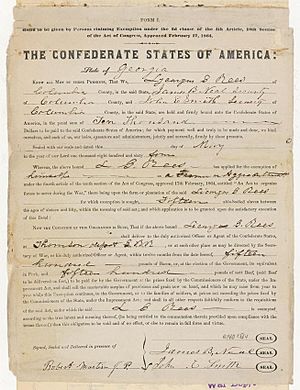Twenty Negro Law facts for kids
The "Twenty Negro Law" was a rule during the American Civil War. It allowed some white men to avoid fighting for the Confederacy. To qualify, a man had to own 20 or more enslaved people on a plantation. This law was part of the Second Conscription Act passed in 1862.
The Confederacy created this law for a few reasons. One big reason was fear. Leaders worried that enslaved people might rebel. This was especially a concern with so many white men away fighting in the Confederate army. The law also came out shortly after United States President Abraham Lincoln announced his preliminary Emancipation Proclamation. The Confederacy was the first in U.S. history to make men join the army by force. Many more Confederate soldiers were forced to join than Union soldiers.
Why the Law Was Made
By the spring of 1862, the Confederate army needed more soldiers. Many men who had joined for 12 months were finishing their service. Not enough men were signing up again. The first conscription law was passed in April 1862. It said all white Southern men aged 18 to 35 had to join the army.
This first law excused some people, like those in transportation or medicine. But it did not excuse plantation managers, called overseers. This meant many plantations were left with only white women, older men, or children in charge. People worried these individuals could not control enslaved people. They also feared they couldn't stop any unrest.
Many Confederate soldiers did not like the conscription law. A soldier named Sam Watkins wrote about it in his book Company Aytch. He said soldiers felt they had done their duty. They wanted to go home and see their families. He wrote that war had become very real, and they were tired of it. He felt that after this law, a soldier was "simply a machine, a conscript."
How the Law Was Passed
On September 22, 1862, Abraham Lincoln issued his Emancipation Proclamation. Many people in the Confederacy believed Lincoln was trying to cause a revolt among enslaved people. To address this worry, and other issues, the Confederate Congress passed the Second Conscription Act. This happened on October 11, 1862.
The new law included a special rule. It said one person could be excused from military service. This person had to be an owner, agent, or overseer. They had to be on a plantation with 20 or more enslaved people. This was to help keep order in the countryside. The law also said the exemption would only last as long as the person was doing their job.
This new rule caused a lot of anger among regular soldiers. Sam Watkins wrote about his feelings. He said the law allowing owners of 20 enslaved people to go home "gave us the blues." He joked that "Negro property suddenly became very valuable." Soldiers started saying, "rich man's war, poor man's fight." This meant they felt rich people were avoiding the war, while poor people had to fight.
Historian Eric Foner explained that many plantation owners wanted slavery to continue. When their goals for slavery clashed with the war, slavery often came first. Despite the anger, not many men actually got exemptions. For example, out of about 38,000 overseers in the South in 1860, only a few hundred in each state received exemptions.
Changes to the Law
Because of the criticism, the Confederate Congress changed the law in May 1863. The new rules said that anyone excused under the "Twenty Negro Law" had to have been an overseer before April 16, 1862. Also, their plantations could not have been divided after October 11, 1862. Some owners had split their land to get more exemptions.
The changes also stated that only plantations managed by a minor, a single woman, or someone serving in the military could qualify. There was also a $500 fee to apply for the exemption.
In February 1864, the law changed again. This time, the number of enslaved people needed for an exemption dropped from 20 to 15. But the person excused had to sell food to the Confederacy. They had to sell 100 pounds of bacon or beef for each enslaved person. Any extra food had to be sold to soldiers' families at government prices.
When the Confederacy lost the war in 1865, the "Twenty Negro Law" ended.
See also
 | Toni Morrison |
 | Barack Obama |
 | Martin Luther King Jr. |
 | Ralph Bunche |


